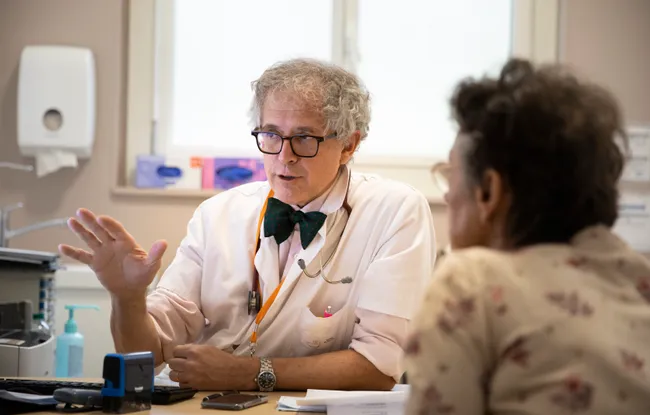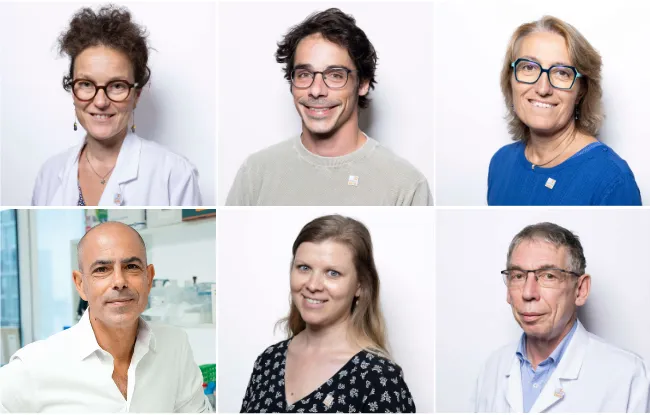- Home >
- Institut Curie News >
- Breast cancer in elderly women: the ASTER 70s study evaluates the usefulness of adjuvant chemotherapy
Paris, 1st of August 2025 – The ASTER 70s study, promoted by Unicancer and Institut Curie, demonstrates that the addition of chemotherapy to hormone therapy does not significantly improve survival in women aged 70 and over with hormone-sensitive breast cancer at high genomic risk. These results, published in the The Lancet journal, represent a major advance forward towards more personalized care tailored to the age and frailty of patients.
In elderly women with hormone-sensitive breast cancer, the question of the benefits of adjuvant chemotherapy remains controversial. The ASTER 70s study (GERICO11), conducted on 1,089 patients aged 70 years and over, is the first randomized phase III study to evaluate the impact of adjuvant chemotherapy in this population with a high risk defined by a genomic signature: the Genomic Grade Index (GGI).
Unproven efficacy, confirmed toxicity
The study compared two groups of patients: one receiving chemotherapy followed by hormone therapy, and the other receiving hormone therapy alone.
After a median follow-up of 7.8 years, the results show that the addition of chemotherapy does not provide a significant benefit in terms of overall survival. At four years, the survival rate was 90.5% in the group that received chemotherapy, compared to 89.3% in the group that did not receive chemotherapy. At eight years, these rates were 72.7% and 68.3%, respectively. The 4.5 point difference at eight years is not statistically significant.
In terms of tolerance, chemotherapy was significantly more toxic. Grade 3 or higher adverse events occurred in 34% of patients treated with chemotherapy, compared with only 9% in the group treated with hormone therapy alone. In addition, patients who received chemotherapy reported a more marked deterioration in their quality of life, particularly in terms of fatigue, pain, digestive disorders, and decreased autonomy.
"The ASTER 70s study marks a turning point in the management of older women with breast cancer. For the first time, a phase III study shows that the addition of chemotherapy does not provide a statistically significant benefit in terms of overall survival, even in patients with high genomic risk. These results confirm that treatment decisions must take into account not only the tumour biology, but also the age, frailty and expectations of patients. They encourage us to review how standards established in younger patients are then applied to older patients without a high level of evidence or with few safeguards. ASTER 70s paves the way for more targeted, equitable and patient-centred oncology," says Professor Etienne Brain, medical oncologist at the Institut Curie and principal investigator of the ASTER 70s study.
Collaborative research at the service of precision medicine
The ASTER 70s study was designed and coordinated by Unicancer R&D, in partnership with teams from the Institut Curie. It involved the GERICO and UCBG research groups, specializing in oncogeriatrics and breast cancer respectively, and drew on 84 public and private centers in France and Belgium, demonstrating rigorous organisation and exemplary collaboration.
"ASTER 70s is study that exemplifies Unicancer’s leading role in academic research. It shows that ambitious clinical trials focused on patient needs can answer questions that have remained unanswered for too long. This collective work will enable us to reduce unnecessary treatments and improve the quality of life of elderly patients, based on solid, representative real life data," said Prof. Jean-Yves Blay, president of Unicancer.
"This study perfectly illustrates Institut Curie’s commitment to personalized oncology. This work dedicated to the oldest patients, who are often excluded from large studies, is a top priority of the IHU Institute of women’s cancer, supported by Institut Curie and fully committed to access to innovation, quality of life for patients and the implementation of highly specific care pathways, particularly for elderly women," said Prof. Steven Le Gouill, director of the Hospital Group of Institut Curie.
Towards a more individualized therapeutic approach
This study marks a decisive step forward in the management of breast cancer in older women. It confirms the need to tailor treatments to the biological characteristics of tumours, but also to the age, frailty and preferences of patients. It invites us to rethink the model for developing innovations that improve standards of care, taking greater account of the relationship between benefits and risks for the elderly population.
The results of ASTER 70s support a rational therapeutic de-escalation strategy for these elderly patients, with adjuvant chemotherapy reserved for specific cases, which two essential complementary research programs (funded by a PRTK and by the ARC) are attempting to identify, drawing on the large set of tumour and blood samples collected as part of the study. These results also pave the way for future research into better tolerated alternatives, such as adjuvant bisphosphonates, CDK4/6 inhibitors or approaches integrating biomarkers of patient ageing.
Bibliographie
Adjuvant chemotherapy and hormonotherapy versus adjuvant hormonotherapy alone for women aged 70 years and older with high-risk breast cancer based on the genomic grade index (ASTER 70s): a randomised phase 3 trial. Etienne Brain, Olivier Mir, Emmanuelle Bourbouloux, Olivier Rigal, Jean-Marc Ferrero, Sylvie Kirscher, Djelila Allouache, Véronique D’Hondt, Aude-Marie Savoye, Xavier Durando, Francois P Duhoux, Laurence Venat-Bouvet, Emmanuel Blot, Jean-Luc Canon, Florence Rollot-Trad, Hervé Bonnefoi, Telma Roque, Jérôme Lemonnier, Aurélien Latouche, Julie Henriques, Magali Lacroix-Triki, Dewi Vernerey, and GERICO & UCBG/Unicancer. The Lancet, 31 juillet 2025. DOI: 10.1016/S0140-6736(25)00832-3



